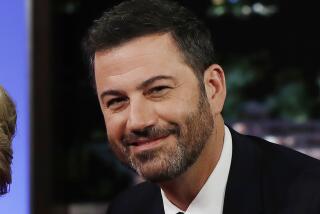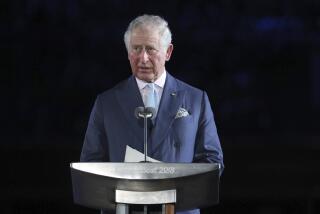Doctors want to end life support for fatally ill baby; his parents want to try experimental therapy. Trump offers help.
- Share via
Reporting from London — For months, Charlie Gard’s parents have held out hope for a miracle.
Doctors at London’s Great Ormond Street Hospital for Children have said there is nothing more they can do for the infant, who suffers from an extremely rare genetic condition that has left him blind, deaf and unable to move or breathe on his own.
But Connie Yates and Chris Gard, who are both in their 30s, want to bring Charlie to the United States, where they say there is an experimental drug treatment available that might give him more time.
Three British courts have supported the hospital’s request to withdraw life support against the parents’ wishes. Then came the crushing news that the European Court of Human Rights in Strasbourg had declined to take up the case.
“He will fight to the very end, and he’s still fighting, but we’re not allowed to fight with him anymore,” Charlie’s father said in a tearful video released by the couple last week. “Our parental rights have been stripped away.”
The heart-wrenching case, which pits the opinion of a highly regarded British medical institution against the wishes of the child’s distraught parents, has brought into sharp relief the difficult ethical and legal questions that arise when doctors and families disagree about the care of a terminally ill child.

Pope Francis expressed support for the family Friday declaring in a tweet that “to defend human life, above all when it is wounded by illness, is a duty of love that God entrusts to all.”
Officials at the Rome-based Bambino Gesu Hospital said they would ask their Great Ormond Street counterparts if Charlie might be transferred to their care for the time that he has left to live.”We know that this is a desperate case and, apparently, there is no effective therapy,” the hospital’s president, Mariella Enoc, told the Italian news agency ANSA.
On Monday, President Trump weighed in.
“If we can help little #CharlieGard, as per our friends in the U.K. and the Pope, we would be delighted to do so,” Trump tweeted, although it was not immediately clear what he had in mind.
Neither the parents, nor the hospital, could be reached for comment late Monday.
However, the hospital has posted a statement on its website in which it gives its reasons for objecting to the transfer to the U.S., namely that the child’s medical team does not believe that the treatment available there will improve his quality of life.
“One of the factors that influenced this decision was that Charlie’s brain was shown to be extensively damaged at a cellular level,” the statement said. “The clinician in the U.S. who is offering the treatment agrees that the experimental treatment will not reverse the brain damage that has already occurred.”
Charlie, who will be 11 months old Tuesday, appeared to be perfectly healthy when he was born in August. But within weeks, his parents noticed that he was less able to lift his head and support himself than other babies his age.
By the time Charlie was admitted to the hospital in October, court records show, he had stopped gaining weight, had become lethargic, and his breathing had become shallow. Tests revealed an inherited condition known as infantile onset encephalomyopathic mitochondrial DNA depletion syndrome, which prevents energy from getting to the child’s muscles, kidneys and brain.
By March, Charlie’s doctors had concluded that to prolong treatment would cause the child unnecessary suffering, so the hospital asked a court for permission to take him off a ventilator.
But his parents found an American doctor who was willing to give Charlie an experimental treatment known as nucleoside therapy that had shown some promise with children afflicted with another form of mitochondrial depletion. They set up a GoFundMe page and raised more than $1.7 million to take Charlie to the U.S.
“We strongly feel as his parents that Charlie should get a chance to try these medications,” Charlie’s mother wrote on the page. “He literally has nothing to lose but potentially a healthier, happier life to gain.”
In a ruling in April, Justice Nicholas Francis of the Family Division of the High Court of Justice said it was “with the heaviest of hearts” that he acceded to the hospital’s request to “withdraw all treatment, save for palliative care, to permit Charlie to die with dignity.”
Although he agreed with the parents that it would be possible (though problematic) to transfer Charlie to the U.S., he said the therapy was “unknown territory — it has never even been tested on mouse models.”
“It is the view of all those who have treated and been consulted in relation to Charlie in this country and also in Barcelona that such treatment would be futile, by which I mean would be of no effect but may well cause pain, suffering and distress to Charlie,” the judge said.
Britain’s Court of Appeal and the Supreme Court of the United Kingdom agreed with that assessment.
Bioethicists in the U.S. said they were not surprised at the courts’ reluctance to force a course of treatment on a hospital that its doctors view as prolonging the death of a patient or causing undue suffering without any meaningful benefit.
“I think it is in all of our interests to have doctors who are solemnly committed to the core commitment of medicine: Do no harm,” said Dr. James Hynds, senior clinical ethicist at the UCLA Health Ethics Center.
But they said both the medical and legal establishments in the U.S. would be reluctant to get in the way of a family that wants to transfer a patient to another credible facility — provided one can be found.
“While we have our own medical judgments here, and we may believe very firmly in them, we also recognize that we’re not infallible,” said Dr. Aaron Kheriaty, director of the medical ethics program at UC Irvine. “Someone else may take a different treatment approach.”
n the video Thursday, the parents said doctors intended to withdraw life support the following day and had denied their request to bring Charlie home to die.
“We want to give him a bath at home. We want to sit on the sofa with him. We want to sleep in the bed with him. We want to put him in the cot that he’s never slept in. But we are now being denied that,” the father said, as he clutched his wife’s hand and fought back tears. “Do you not think we’ve been through enough?”
On Friday, Charlie’s mother told reporters that the hospital had agreed to give the family more time to say their goodbyes.
“We’re making precious memories that we can treasure forever with very heavy hearts,” she said.
Twitter: @alexzavis
Special correspondent Boyle reported from London and Times staff writer Zavis from Los Angeles.











